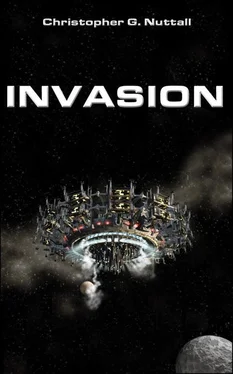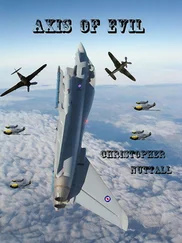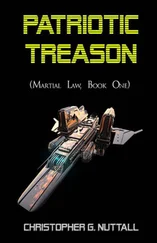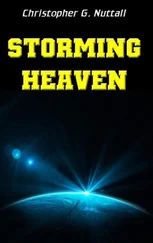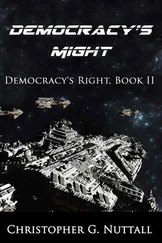Enough greenbacks to carpet the moon , he thought, as he took a beer and relaxed.
“So,” he said, finally, once he’d caught up with his people. “What did they get you for, eh?”
“I’m a reporter,” Joshua admitted. “I used to blog a lot about life under occupation. They didn’t like it.”
There was a long pause. “Well, fuck me,” Sergeant Mancil said, finally. “Are you telling me that I risked life and limb to rescue a fucking reporter?”
* * *
Joshua hadn’t been expecting rescue at all, let alone in such a dramatic manner, and he was grateful to them for their timely appearance, but there was no way that he was going to let that pass.
“Tell me something,” he said, acidly. “Is there something wrong with being a reporter?”
“Oh, I don’t know,” Sergeant Mancil said. “Only countless missions compromised, lives put at stake, reputations ruined, minor and isolated incidents blown out of all proportion… I’d say that there’s a lot wrong with being a reporter.”
“I must have been doing something right,” Joshua countered. He’d had similar debates before and they’d always ended up as screaming matches. It might have been childish, but there was a part of him that would never abandon an argument. “They wanted to kill me… and not just kill me, but make an example of me.”
“And there are others who sing the praises of the enemy,” Sergeant Mancil hissed. “In every war we have fought, people like you have served as a fifth column, sapping the morale of our side and encouraging the enemy. Do you have any idea how much damage you do with a single unquestioned report from the enemy? Do you even care if the facts are right, provided that the story is hot enough to get you a promotion and some fame?”
Joshua’s eyes glinted. “And you don’t think the public has a right to know?”
Sergeant Mancil matched him. “You think the public has a right to know everything? Do they have a right to know that an operation is kicking off well in advance of its start? Do you have a right to tell the world everything about our damn deployments?”
He leaned closer. “And don’t you have an obligation to at least tell them when you’re printing shit the enemy gives you?”
“Don’t the American people have a right to know what is being done in their name?” Joshua demanded. “Shouldn’t they know when the CIA is backing the latest unsavoury bunch of oil-rich fucks in a nothing state? Shouldn’t they know when America is being used to prop up dictatorships… and then acts all surprised when the people of that state decide they hate us?”
“And so you sell them shit?” Sergeant Mancil asked. “Are you so surprised that no one trusts a reporter?”
“Was it shit when the CIA decided that it would be a good idea to back the Iranian Shah against a democracy?” Joshua asked. “Was that really such a hot idea?”
“And who was it who convinced the public that the war in Iraq was so immoral? Who is it who convinces the students who have never worked a day in their lives that ever tin-pot dictator is a good and kind ruler?”
“If you two would both shut up,” Brent said, angrily. “You both need to blow off some steam, but if you shout any louder, the neighbours will hear. It only takes one call to bring the aliens here and then we will all die.”
He waited for them both to simmer down. “The argument doesn’t matter to us,” he continued. Joshua felt the words as a slap… and, judging from his expression, Sergeant Mancil felt the same. “For the moment, we have a common enemy and something of a problem. Joshua, how did they find you?”
“I was betrayed,” Joshua said. The pain of the memory resurfaced as he remembered that final look. “I don’t even know why !”
“We can visit him and… teach him the error of his ways,” Sergeant Mancil said, when he’d explained. Joshua recognised it as a peace offering of sorts, although not one he wanted. “There are too many people like him out there, betraying their fellows just to get some reward from the Redshirts. Once we make an example of him, perhaps there’ll be a lot less willingness to betray people.”
“Perhaps,” Brent agreed. He looked over at Joshua. “Are you sure they didn’t track down your Internet connection?”
Joshua blinked. “I don’t think so,” he said. The very thought seemed crazy. “They couldn’t have mastered our Internet so well, could they?”
“Perhaps,” Sergeant Mancil offered. “Their weapons work on the same principles as ours, so why not their computers? For all we know, they have the same collection of porn and dating sites that we do.”
“They’re religious,” Joshua protested. “They wouldn’t do that.”
“What sort of reporter are you?” Brent asked, amused. “It’s the religious lot and the moral majority who spend most of their time on the net, looking at naked babes. I remember bursting in on this jackass of a terrorist in Iran — ah, forget you heard that — and you know what he had on his computer? Spanking movies!”
Joshua found himself sniggering. “Spanking movies?”
“The latest and best from Lombardi Productions, so I’m told,” Brent said. “Can you imagine him? Going to the mosque, leading his bunch of merry women-haters, gay-bashers and general scumbags in prayer, and then coming home and jerking off to the images of pretty western sluts getting their butts beaten.”
His face darkened suddenly. “But if we can hook you up again, we can use you to put out propaganda of our own,” he said. “Welcome to the resistance.”
Doesn’t anyone know? We hate the French! We fight wars against them! Did all those men die in vain on the field at Agincourt? Was the man who burned Joan of Arc simply wasting good matches?
—
Blackadder
The Channel Tunnel, Philippe Laroche had been surprised to discover, had survived the alien attack, even though picking it off from orbit wouldn’t have been that difficult. The train links from Paris to the French side of the Tunnel, and then from the British side to London might have been destroyed, but the tunnel itself remained intact. He took a car from Paris to the tunnel, rode through on a train that remained firmly under cover, and then picked up a second car in Britain. International trade might have almost ground to a halt, but there was still enough petrol for government requirements, even though every government in Europe was restricting petrol for emergency use only. The British motorways, once packed and heaving with traffic, were silent and, somehow, eerie in their desolation.
The last time he’d visited London, he’d used a French private aircraft and the trip had only taken a short period of time. Now, the drive up from Dover to London took nearly three hours, most of it spent avoiding damage caused by alien bombardment. The aliens had picked off bridges, intersections and even a handful of transport convoys from orbit, something that had battered the motorway network into a handful of broken sections, requiring careful navigation to surmount. It was the same story in France, Germany and the rest of Europe; he was unsurprised to see British soldiers patrolling the streets, just as other soldiers were in Paris. The aliens had caused enough devastation to ensure that civil unrest remained a very real possibility.
“That was Ten Downing Street,” the driver said, as they drove through London. There were fewer places for the British population to go than in America or France, but without petrol, they had to walk all over London. The underground links were no longer working. Philippe had been to the centre of British government before, but now… there was only a pile of rubble. It was the same story at the Houses of Parliament and Buckingham Palace, although in the case of the latter he found it hard to understand why the aliens had bothered. The British Royal Family didn’t actually run the country these days. “They just bombed it from orbit, but missed anyone important.”
Читать дальше
